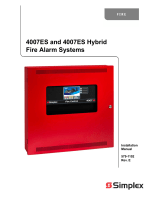
4. Specifications
No. Item Specification
1 Rated voltage range of SLC input power (S+,S-) 22.0 to 24.0V
2 Maximum SLC 24 VDC standby current (S+,S-) 250μA
3 Maximum SLC 24 VDC alarm current (S+,S-) 250μA
4 IDC input circuit wiring style Class B (Style B)
5 End-of-line resistor for IDC 5.1kΩ,1/2W
6 Maximum wiring resistance of IDC 100Ω
7 Maximum wiring capacitance of IDC 1μF
8 Operating temperature range 32 to 120F (0 to 49C)
9 Operating humidity range 0 to 93% (non-condensing)
10 Maximum no. of module per loop 127 units
11 Dimensions 2.58”(65.5mm) (H) × 2.32”(59mm) (W)
× 0.94”(24mm) (D)
12 Applicable electrical box for installation 2-1/2”(64mm)deep single-gang box
These instructions do not purport to cover all the details or variations in the equipment described, nor provide
for every possible contingency to be met in connection with instillation, operation and maintenance.
Specifications subject to change without prior notification
For Technical Assistance contact Potter Electric Signal Company at 800-325-3936
Actual performance is based on proper application of the product by a qualified professional.
Should further information be desired or should particular problems arise, which are not covered sufficiently
for the purchaser's purpose, the matter should be referred to Nohmi or a distributor in your region.
Potter Electric Signal Company, LLC
1609 Park 370 Place, Hazelwood, MO 63042 USA
Telep hone: (8 66)956-1211
URL: http://www.pottersignal.com




